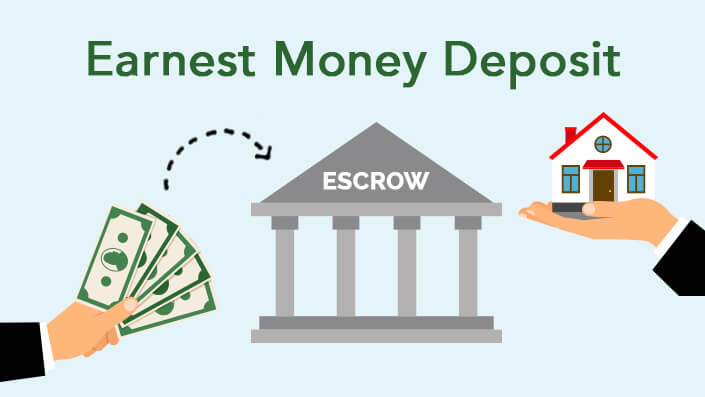
The Who, What, Where, When, and Why (and maybe even a Why, Not?)
In real estate lingo the Earnest Money Deposit (EMD) is also known as the Good Faith Deposit in escrow lingo. This is the monetary deposit that a Buyer offers to the Seller as good faith when a contract to purchase the Seller’s asset is signed, sealed, and to be delivered to the Escrow Holder to hold, as the neutral third party.
Aha! In one sentence I took care of all the “W’s in the topic.
Unfortunately, because it is MONEY and people are loathe to be divested from it with (or without) just cause, this article will be a little longer than just this one paragraph. Too bad.
So let’s go back and address each “W” independently.
The Who
It certainly isn’t the rock band, for sure, but WHO gives the EMD is invariably the party who wants the asset and has made a commitment to purchase, normally subject to a few conditions.
The What
In normal transactions the easiest form of a negotiable instrument to deposit is currency. In other words, good old cash. As Escrow companies are governed strictly when it comes to taking in cash, it is necessary that the Buyer converts that into a form of a check, cashier’s check, or wired funds.
That is not to say that it can only be cash; a good faith deposit could be other types of assets that the Buyer is willing to fork over and the Seller is willing to use as collateral to secure the transaction. The pink slip to a car, for instance, or certificates signed over for certain stocks, etc. Unfortunately, an Escrow Officer may not have the ability to hold these types of assets and what happens if the assets devalue or rise during the period of the transaction? What will be the actual monetary value that can be set on a closing statement? What happens if complications arise and the transaction falls through? So, cash in the bank is man’s best friend and that it why it is called the Earnest Money Deposit.
The Where
As mentioned in The What, the good faith deposit is usually given to the Escrow Holder to hold. Now, if you do not know what or who an Escrow Holder is, this is the “settlement agent” or “stakeholder” (many names for the same role) who is a neutral third party designated by the Buyer and Seller. It is a depository of the funds and documents, it prods the parties to fulfill the contract drawn up, and then when done, transfers and exchanges said funds and documents to the end party. There is an article about the California Escrow role at this location:
Funds given to the Escrow Holder are held in trust and deposited in a federally insured bank account – a “Trust account” is what we call it in escrow language. The parties may think otherwise, but while the transaction is running its course this EMD belongs to neither the Buyer or the Seller. This is important because later on we will talk about what happens if the transaction cancels.
The When
Once the Buyer has made an offer to purchase the EMD usually follows immediately. Sometimes a check is tendered at the same time as the offer is made to the Seller or his representative. If the offer is accepted the check with the accepted offer is handed to the Escrow Holder and an escrow transaction opened. There are times when the Buyer gives the EMD directly to the Seller’s account, but that is rare unless the Buyer and Seller have a mutually trusting relationship. Usually the parties are unknown to each other and require that a third party to become the middleman. No matter who gets the money, the WHEN is usually when the transaction is opened or shortly thereafter.
The Why
Let’s say you are the Seller with a valuable asset to sell and there are any number of parties who want to buy. After the final sale price is negotiated the Buyer will want to be sure he can hold you to that price and you will no longer consider other offers. You, on the other hand, want to be sure that the Buyer is sincere in his offer to purchase as you have given up the opportunity of other offers. As an inducement for you to honor the contract the Buyer will make a cash deposit to show that he is acting in good faith. Hence the “good faith deposit” or “earnest money deposit”.
Is there a Why Not?
Is there a time when an EMD is NOT necessary? Yes, and that may be when the two parties have implicit trust in each other that the transaction will be followed through to its final closing. A sale between relatives is a good example. There is no law that states there must be an initial deposit in order to finalize a contract.
Now that we have finished with the “W”s, there are other considerations:
How Much?
As there is no law that states there must be an initial deposit, so there is no law that states how much it should be if one is considered. This is part of the negotiations between the parties and can be based on what is customary practice in the area. Buyers would like less in case the transaction goes south; Sellers may want more to make sure the Buyer performs.
What happens to the EMD through the transaction?
As the good faith deposit is Buyer’s guarantee that he will perform, there are always strings attached to it, and these strings are normally called conditions or “contingencies” to the transaction. As contingencies are met the transaction moves forward and the EMD becomes a part of the downpayment for the sales price. If the contingencies cannot be satisfied, normally the contract calls for a cancellation by all the parties and the return of the EMD to the Buyer.
Can the EMD be used to pay bills before closing?
The funds are held in trust, and once deposited it will belong neither to the Buyer or the Seller. Any disposition of it (or part of it) will require the consent of both parties. For instance, if there is a Homeowners Association that requires up front fees to release documents for the Buyer for review, we ask the Seller to advance the funds instead of touching the EMD. If he cannot, then, to take it out of the EMD, the Escrow Holder will need to draw up an amendment for parties to agree to use the funds to pay.
Cancellation of the contract – different tricky scenarios
As said before, if the contingencies cannot be satisfied the contract can be cancelled, if it is written up that way, and the EMD returned to the Buyer once all parties agree to the cancellation in writing. The important part is that all parties agree in writing to the cancellation and return of funds.
- What happens if the contingencies are satisfied or removed and the Buyer or the Seller decides he does not want to continue? This is a scenario that comes into play more often than we like and there is not one sure solution. A purchase contract and the escrow instructions signed by parties holds them accountable to the contents under Contract Law . If a party decides not to continue and the reason behind their request to cancel is not a condition that was specified in the contract, this party will then be in default.
- What happens if the contact calls for a 21 day contingency period, it is the 22nd day and the Buyer has not removed his contingencies? Can the Seller demand a cancellation and take the EMD as his Liquidated Damages?What happens when the transaction just sits there because the Buyer cannot remove his contingencies and yet he does not want to give up? What is the Seller’s recourse? Here are some of his options:
- What happens if there was an early release of the EMD to the Seller and then the transaction cancels? Yes, there are a lot of transactions in which the Seller writes into the contract that the EMD will be given to the Seller once certain (or all) contingencies are removed.
If the Buyer agrees, he has to understand that with the EMD out the door, cancelling the transaction afterwards and trying to get the money back will become seriously difficult as reliance is made on Seller voluntarily returning the funds. Not an easy thing at that time. This is why an early release of funds is not recommended unless the parties really know what they are doing.
If it was the Buyer, the possibility of losing that EMD becomes very real because that’s the reason for the EMD – a hedge against the Buyer not fulfilling the contract.
If it was the Seller, then he leaves himself open to a lawsuit and/or the filing of a Lis Pendens against the property, which would effectively stop him from selling at all until the matter is resolved.
– Negotiate with Buyer! Give him reasonable additional time to complete
– Demand to close immediately or cancel and take the EMD as liquidated damages
– Demand to close immediately or cancel and give the Buyer the EMD back
There is never a sure fire solution.We find ourselves often starting the conversation with the word “depends”. It is all a matter of looking at the circumstances of what has transpired and then negotiating to see if there are common ground. What has to be emphasized is that whatever the solution, it has to be agreed by both parties in writing. Sometimes no solutions can be found and the big guns have to be brought in. An attorney letter might lever some more pressure. No one wants the expense of a lawsuit..
What happens when there is no agreement? If there is none, then the funds remain in the Escrow Holder’s Trust Account until an agreement is achieved, however long that takes. I had one file in which I held the funds for 5 years because there was no resolution.My file had cancelled, the property was long sold to someone else, but no one could agree on how to resolve the matter of the good faith deposit. This is why I mentioned early on in this article that once the funds are deposited into the Trust account, the funds do not belong either to the Buyer or the Seller. Both might have a claim on it.
If the dispute become contentious and goes into a lawsuit, as long as the Escrow Holder is not involved in the lawsuit, the Escrow Holder has the right to take themselves out of the equation by filing an interpleader and sending the funds to the Courts. The Courts will then hold the funds pending the resolution to the lawsuit.
There are many other scenarios of contract cancellations. This article does not delve into that because the cancellation of a contract can involve legal issues which the writer is not able to comment on. The readers are cautioned to seek independent legal counsel for your particular cases.
In doing this article we found that these are the most common questions that we are asked:
- Can we get our earnest money back
- When can we get the earnest money deposit back
- What happens to money in escrow if buyer backs out
- Can the seller keep my deposit
- Is the earnest money deposit refundable
- Who holds the earnest money deposit
- What happens to the earnest money if the buyer backs out of the sale
- Can earnest money be refunded
Hopefully, this article answers these questions because “depends” is such a nebulous answer!
If you have any other questions or scenarios that you would like to talk about, please contact us. Questions deserve answers, or at least, the best answer that we can give.
This article will be updated if new scenarios come to our attention so be sure to check back from time to time!

Juliana Tu, CSEO, CEO, CBSS, CEI, SASIP
Escrow Manager

Good news! “The Art of Escrow” is out! Look for it on www.amazon.com!

The Art of Escrow:
The Fight For Your American Dream and the Pursuit of Homeownership
Available now at Amazon.com
- Threats to Escrow – Part 5 – Document Fraud! - May 19, 2023
- When the Loan Got Sold and You Just Closed Escrow - April 6, 2020
- Mechanics Lien - October 7, 2019
- Are You a Foreigner and Need to Know About U.S. FIRPTA Withholding Laws? - February 20, 2019
- When the FIRPTA
Withholding Goes Wrong - February 20, 2019
Join Our FREE Viva Escrow Forums
